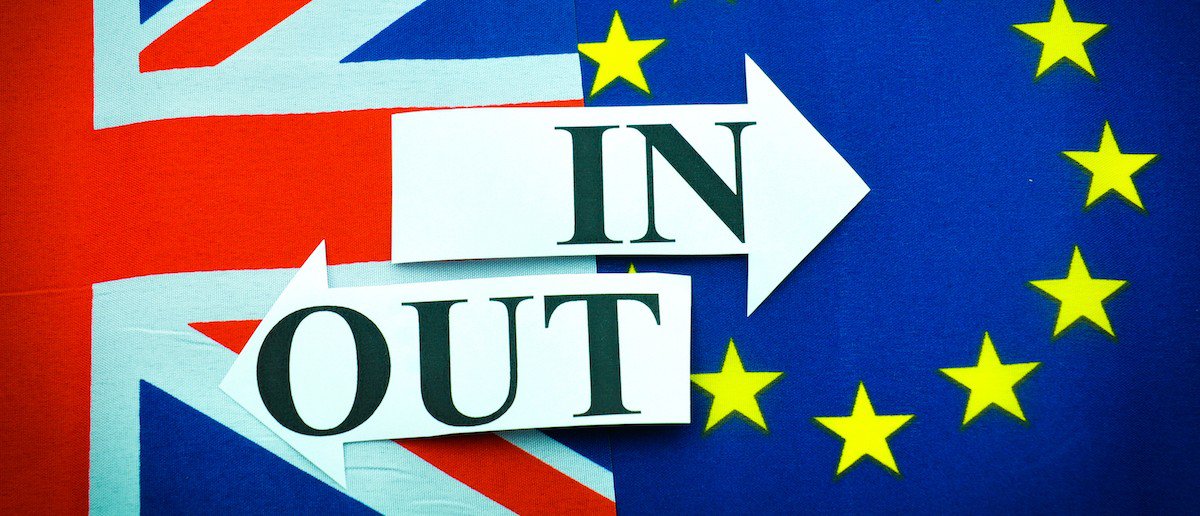Love thy Neighbour
Let’s not underestimate the significance. The fuckers have lied to you. Because you are all merrily heading blindly to the poll thinking you’re going to change the economy, regain sovereignty, or put a halt to immigration. But the truth is much worse.
On Friday morning, the UK will wake up to a vastly changed political landscape. The referendum is not about the torrent of issues that politicians have barraged us with for the last few months like keeping Johnny Foreigner out of our green and pleasant land, or the shape of bananas, it is about one question – do you want to be a part of a Federal United Kingdom, or a Federal Europe?
Either way, the UK will never be the same again. If we vote leave, aside from the years of reinventing laws and sorting practicalities like fishing and farming subsidies, we will have a new referendum in Scotland to deal with. Does anyone actually think these things through? A large portion of the Scottish people refuse to be governed by a UK federal government, but they are happy to be ruled by an ever closer European Union instead, if you take a second to think it through, it doesn’t make much sense and is potentially catastrophic for the UK.
The whole thing is barmy, primarily because most of the UK public are not in any way informed enough to make such a huge decision, but more so because the whole thing is a crime of passion. Passion about immigration, about sovereignty, about public services busting at the seams, but ironically enough, there isn’t enough passion from the general public to really get behind it. It’s easy to get passionate about patriotism, but particularly for England (where most of the population actually lives), patriotism is some form of passive racism. I’m going out on a limb here but I’m predicting voter turnout of less than 60% – the Scottish referendum only achieved mid-80’s, and that was the highest turnout in recorded history.
The even bigger irony is that in or out, the British Isles will remain a part of Europe whether you like it or not. Unless we get a massive jack-hammer and some very skilled bargemen, we are stuck there. It’s very easy to get stuck with the island mentality, but we are most definitely continental, like it or not.
Indulge me for a moment and let’s put it in to context. The tsunami in Japan was about as tall as the English Channel is deep, so you’re talking the height of an electricity pylon, or the statue of liberty. In other words, with a few good years of drought, you could cycle to Calais to buy a baguette.
I have to also admit right at the beginning, I voted with my feet years ago – I’ve lived in continental Europe for most of my adult life, and so the result of your vote (for which I’m not entitled to take part in) will affect me greatly.
Although if I was actually entitled, at this stage I would probably vote to Leave. I’m full of contradictions.
So let’s go back in time. The EU as we know it today was an idea set up by a group of wartime visionaries (our own Winston Churchill amongst them) at a time when Europe was royally screwed. Post-war Europe was bleak, skint, and covered in rubble. The goal was to recover the economies and work together to share resources and trade freely. Today however, they’ve removed the word ‘economic’ from the title, and the Union covers everything from the shape of bananas to wind turbines.
If you wanted to actually make Europe work, then let’s just centralise the parts that make sense, and devolve everything else locally – just like they have in Scotland. A centralised armed forces makes complete sense on either side of the fence (and no, you don’t have to give up your own army, you just need to pool resources), and similarly, with finance, the EU goes between number 1 and 2 in terms of the size of the economy (GDP) against the USA and we are leaps and bounds ahead of everyone else, including China.
This all matters because no matter what we think, the UK will never be able to compete with superpowers; the size of our island is always going to hold us back.
China and India are both catching up quickly in their modernisation efforts, we will probably soon see a monolithic Islamic State, and the Arab world will clump together more so than they have already – and we will be left on the fringe, holding onto history and still apologising for the Empire. In short, the UK by itself cannot stand up to America, and with the possibility of Donald Trump being the President, this is more important now than ever.
So what about the issues at hand? I have watched the debates, absorbed the constant drip of news, and still, no-one seems to really grasp the issues. The politicians are busy answering “that was an excellent question, but I think the real question is…” and completely sidestepping the point.
Immigration
And so let’s get started, and the best place to start I think is with the obvious – immigration. And yes, I’m going to put it out there: the UK looks like a bunch of racists from the outside. Not in a shouty, saying horrid words and beating people up kind of way, but in a “I don’t like change, leave me and my jobs alone” kind of way. The sad thing is that a Brexit will not change a thing. Really. It will not change a thing.
Go back in time and you’ll see all kinds of invaders from the Picts, to the Angles, the Romans, the Celts and it goes on and on – we have been pillaged by invaders endlessly over the centuries. Today, to make it worse, we have those ‘pesky Eastern Europeans’ who snuck in with their odd shaped sausages and stinky bean soups.
So here comes the bad news – the UK has already changed.
There are around 3 million people living in the UK who weren’t born there, and any high street will be full of sights, sounds and smells that don’t come from Blighty. Voting Leave will not change any part of that – do you really believe that you could simply kick them out of the country? More than 80% do actually have a job (your job, the one that was too low paid and beneath you to accept), and most of the rest are probably raising children. Worse, our companies would lose valuable skills overnight.
The Leave campaign have been shouting loud that the Schengen area (that’s the agreement that allows you to travel without a passport in most of continental Europe) is allowing terrorists and other criminals to move freely. They also tell huge porkies about the ability for the UK to deny entry to EU citizens. In fact, compared to the rest of the EU, we have it pretty well wrapped up. The EU itself does have borders; land, sea and air – it just so happens that once you’re in, you can put your passport away – the same as North America, Australia, India, China and other similarly sized chunks of land.
We are allowed to deny entry to criminals, and known persons. Fact (it’s the EU Citizenship Directive 2004 in case you want to check). And even though strictly speaking you can’t blanket deny access to convicted criminals, with the freedom of information across Europe, we could easily build a flagging system into our border computers to flag up murderers, rapists and paedophiles and stop them from the start. You will see this as a recurring theme – a little dollop of common sense could cure all of our gripes.
So instead of common sense, and to cure us of all future invasions, we will have to pull up the drawbridge, and get the snipers at the ready. But they are already here, so what difference will it actually make? Not convinced? Think on this: in actual fact, around 50% of immigrants are from outside the EU, and half of those come to the UK to study which brings vital money and diversity into our Universities. The so-called problem is hugely exaggerated and it can be solved with one simple change…
…The Welfare State (Benefits)
It rains quite a lot in the UK, most of the population have the general appearance of a milk bottle, and it got so bad, we even have lamps in bedrooms to stop SAD. Europe has some beautiful places to settle far before you reach the hallowed British Isles, and so why do they come? The answer is pretty simple, yet curiously solvable – our Welfare system is generous (far more generous than our European cousins), and it makes it a no risk strategy to cross a border. Can’t find a job? No problem. We will house, clothe and feed you. Sorted.
Oh, and by the way, we can actually change this. For all his failings, the Prime Minister has already negotiated a pay-in before you get out system that we can have straight away. Another simple solution.
The Economy
And so back to the issues: the economy. Wow, do our fearless leaders love to bang on about the economy. There’s no easy answer here – Leave, and we get to be masters of our own destiny (but lose quite a lot of EU dependent jobs in the short term like finance and pharmaceuticals), but stay and you’re giving away more than £30m per day for centralised redistribution. That money will leave your pocket and go to a central source whatever happens, and so if you accept paying the taxes, your next question should be one of value for money.
This is where it starts to get complicated. The Remain campaign are arguing that your £200+ donation per household actually nets you more than £3000 in benefits such as cheaper cars, perfectly round oranges and going to Spain without a visa. The Leave campaign will tell you it’s nonsense and that we should be the masters of our own destiny. As a normal person, does it really matter to you if London or Brussels is deciding how your money is spent? It’s still not you deciding after all.

It’s a bit of a cop-out, but the answer really is that there isn’t an answer. We have no idea how long it would take to come up with a trade agreement in Europe, it took Canada the better part of a decade. I’ve heard lots of people saying that it doesn’t really matter with a globalised economy (“you can buy whatever you want on Amazon”), but we are all sadly missing the point again. Free trade in Europe means not having to worry about import duty, VAT complications, and a single currency across Europe means that business is cheaper and less complicated.
Imagine a scenario where BMW chooses to manufacture a Mini in the UK, outside of the European Union this would make no sense as they would have to pay to import it back into Europe once it is manufactured. It is the main reason that you don’t see Europe flooded with American cars even though they drive on the same side of the road. It’s not about whether you can buy things from other countries – of course you can, you can do it today from pretty much anywhere in the world. It starts to matter when you’re making things, or providing services, and if it was my business buying a service from a UK company. In the example of BMW – I would simply go somewhere else in Europe and save myself 20%.
The Law
Speaking of deciding, let’s move on to the law. The Leave campaign will tell you that around 65% of UK laws are imposed on us by Europe, yet the Remain campaign say it’s as little as 13%. How is anyone supposed to make sense of that? It’s difficult because the UK doesn’t have a written set of rules in the same way as newer democracies like the USA has.
To answer the question of how much reach the EU has in our legal system, you have to take a moment to understand how laws are made. In our common law system, we have statutes (which are written laws made in Parliament) and we have precedent (where judges or long established custom decides). We have written laws for things like the framework of the NHS, but when it comes to really important issues such as euthanasia, we have past precedent to rely on (that’s why you see those old duffers in wigs debating endlessly). In this example, the law for a ‘murder’ is far too general to make any proper conclusion and so judges interpret the law, and that’s where the real law making is done. The point is that it’s pretty much impossible to say how much Europe affects us because of this, but we do have the power of a veto, and other than human rights, we have the final say on everything.
One argument that resonates with me paves the way to a federal system. Laws that are best served in bulk are made in Europe, and everything else should be done within the United Kingdom. At the moment, the EU pretty much dictates agriculture, fishing, trade and the environment – everything else they have very limited reach on and rightly so. The question is why should they dictate these things? The short answer is that it makes sense to have common policies that affect people beyond our borders – we have common access to EU waters (and so we have to have a common law), and the same is true for trade and the environment.
A United States of Europe is scary to most – Turkey joining the EU is one big reason with their 70 million citizens all sat waiting at the border ready to make a run for it. The Prime Minister suggested they may qualify in around the year 3,000 and although it’s massively exaggerated, there is no danger of those Turks arriving anytime soon – their entire political system will have to change, the economy will have to stabilise (joining the Euro is mandatory for new members), and the tests for entry are so strict, that if they do pass it, we should welcome them with open arms. But again, sort out the welfare state and they’ll probably stop in Germany instead.
Those Pesky Un-elected Officials
In the EU we have a very odd situation in which the civil servants appear to rule the roost, and the elected officials have a reputation for being a bit limp. Fair or not, the rules are actually quite similar to the UK parliament. Civil Servants (the council) prepare a draft, and the parliament have to approve it – if they can’t agree, the parliament have the power to drop it. It’s as simple as that really, and the idea that un-elected officials can make laws is just a nonsense. We probably just need to vote for better qualified, stronger MEPs to actually reverse the trend.
Let’s break it down even further – the argument is usually ‘a bunch of un-elected officials that you can’t even name’. So grab a pen and let’s do a quiz. Can you name the Prime Minister? Let’s hope so, and what about the Chancellor of the Exchequer, maybe – and the Minister for Education, or what about your local MP? Doubtful.
So there you have it, they are elected, it just happens that we’re more interested in voting for a dancing dog on BGT rather than a dancing monkey in the EU.
Britain is largely disengaged from politics in general, look again at what happened in Scotland and the momentum the campaign gained when people actually started to care.
Fishing and Farming
Most farms don’t make much money. Prices have been squeezed so much that farmers now rely heavily on subsidies to make a living. The Land Rover you see whizzing around the B323 is 50% subsidised, yep farms rely on EU subsidies for a whole 50% of their income. Shocker.

Today, more than 70% of all our farm produce goes to Europe, and it is thanks to the EU that the ban on British Beef was lifted after we discovered a bunch of mad cows in the countryside – the USA used to be a massive export market but today it accounts for nil.
So what’s the argument here then? It’s the economy, stupid. That old chestnut, back to haunt us and this time it’s about getting less out than we paid in. But is that really true? If you apply basic maths then the answer is obvious, but it all comes back to access to that single market. If two thirds of all our produce is sold within Europe, and all of a sudden we are hit with import duty, then we will end up subsidising farmers even more to enable them to be competitive and you’re right back in the same situation.
Fishing though is where it gets tricky. Fish stocks were massively depleted and so the EU legislated against it to try and control the fisheries – I remember seeing the 9 o’clock news showing UK fishermen throwing away fish because it was over their quota. There seemed to be no logic to this, it was complete madness and shock tactics to make the UK public angry about their plight. If they hadn’t done it, we would have no fish left as they weren’t being given enough time to breed before being scooped up and served in batter. And more than anything, it stopped other countries entering our waters and making the problem worse.
It is sensible then go to back to the beginning, and here we have to look at the single market again. We agreed to fishing and farming common policies because we wanted a level playing field across Europe to sell our goods, we took the tough decision to accept the fishing quotas (again, we could have used a veto to stop it), because otherwise the North Sea would have run out of Cod and Haddock. Other countries manage just fine, they don’t just slap batter on and deep fry, they eat a variety of fish – the issue wasn’t “we can’t catch fish because of the quotas”, but the issue was the type of fish that happened to be popular in the British Isles. There were plenty of other fish in the sea, you might say.
Personally, I’m massively intrigued as to what would happen if the UK votes to Leave the EU. The cost and time of remaking the laws alone would take years and millions, if not billions of pounds – and do we just adopt all the current laws, or spend the next ten years debating new versions?
Look at the practicality of immigration. Let’s assume that the UK chooses to Leave, and we close our borders to EU citizens. What happens to those already here, who have jobs and work? There would have to be some sort of freeze on incoming EU migration, then you would have to work out a new visa system, and then there is the small matter of the 3 million people who are already in the country. Imagine the sheer amount of processing time, communications, documentation and everything else that it would take to have those existing EU citizens processed through a new system. Many more billions, and years and years of work.
That is why voting to Remain is for me the only sensible choice. Yes, I don’t believe that the government will fix the structure of the EU, but a renegotiated relationship with the union, and a newfound political awareness in the general population means that we may actually bother to turn up and vote, and we may just hold our politicans to account when they fail to veto things that just don’t make sense.
Having said all of that, I strongly believe that we are being hoodwinked. The vote is not to Leave or Remain, the exit negotiations would be so complex that the terms would get watered down, and diluted over the next two years. Whichever way we vote, we won’t be able to exit the EU – free trade will mean contributing to the EU in the same way Norway does, and it will probably still mean free movement of people even if it is mimicking a visa waiver type scheme. There’s no way we can turn our backs on such a huge part of our economy.
Immigration won’t be solved; the country has changed already. Laws won’t change because it’s too complex, costly and time consuming to do so. And we still need access to the common market which means contributing and allowing free movement to some extent.
So with that, I have finally convinced myself that you should definitely vote to Remain. Our politicians are like a bunch of children in the playground, and I don’t trust that they will do what’s best for the future to reshape the United Kingdom – we can say no to a federalised Europe if that’s what we really want (and that could happen any time in the future), we don’t have to use the Euro, and with a few simple changes, we can curb immigration, stop hard criminals entering the country, and demand some changes to the way the EU is funded. Leaving is permanent, whereas hedging your bets with the status quo might just be the most responsible thing you will ever do.
(Note from The Editor: The Duke has once again crept in to The Glass House to have his say on the state of the political system in the UK. To read more of his musings and tuppence worth, you can visit his author page and find out more about him here.)








